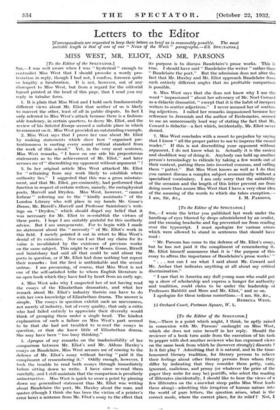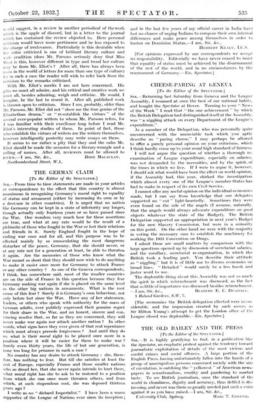[To the Editor of the SPECTATOR.] SIR,—There is a point
which might, I think, be aptly raised in connexion with Mr. Parsons' onslaught on Miss West, which she does not raise herself in her reply. Should the reviewer of a book turn aside from the execution of his task to pepper with shot another reviewer who has expressed views on the same book from which he (however strongly) dissents ? Is it fair play ? Admitting that it is natural, and in the time- honoured literary tradition, for literary persons to relieve their feelings about other literary persons from whom they differ by indicating that they consider them petty, vain, ignorant, malicious, and penny (or whatever the price of the paper they write for may be) pontiffs, who select the reading of illiterates (incidentally, I should like to hear the views of a few illiterates on the somewhat steep paths Miss West leads them along)—admitting this irruption of human nature into the world of pure letters,- the question arises, what is the correct mode, where the correct place, for its relief Y Not, I would suggest, in a review in another periodical of the work which is the apple of discord, but in a letter to the journal which has contained the review objected to. Here personal criticism would have more pertinence and be less exposed to the charge of irrelevance. Particularly is this desirable when the critic criticized is one of brilliant literary culture and wide erudition (does Mr. Parsons seriously deny that Miss (Vest is this, however different in type and trend her culture may be from Mr. Eliot's ? After all, there has always been room in the world of letters for more than one type of culture) for in such a case the reader will wish to refer back from the criticism to the remarks criticized.
With Mr. Eliot's merits I am not here concerned. His gifts we must all admire, and his critical and creative work we must all, besides admiring, weigh and criticize. He would, I imagine, be the last to resent it. After all, published work is thrown open to criticism. Since I am, probably, older than Mr. Parsons, Mr. Eliot did not "show me the true genius of the Elizabethan drama," or " re-establish the virtues " of the several ever-popular writers to whom Mr. Parsons refers, for I was familiar with their excellence long before I read Mr. Eliot's interesting studies of them. In point of fact, those who establish the virtues of writers are the writers themselves, however intelligently posterity may write essays on them.
It seems to me rather a pity that they and the calm Mr. Eliot should be made the occasion for a literary wrangle and a calling of names. After all, reviewers must be allowed to retiew.—I am, Sir, &c., ROSE MACAULAY. Ncrrthumberland Street, W.1.















































 Previous page
Previous page